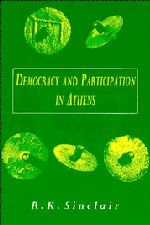Book contents
- Frontmatter
- Contents
- Preface
- Maps
- 1 The Athenian polis and the evolution of democracy
- 2 The privileges and the opportunities of the citizen
- 3 The responsibilities of the citizen
- 4 The sovereignty of the Demos, officials and the Council
- 5 Citizens and participation
- 6 The hazards of leadership
- 7 The rewards of leadership
- 8 The critics of Athenian democracy
- Appendix 1 The population of Athens
- Appendix 2 ‘Working days’
- Appendix 3 Notes on three constitutional matters
- Bibliography
- Index
8 - The critics of Athenian democracy
Published online by Cambridge University Press: 01 June 2011
- Frontmatter
- Contents
- Preface
- Maps
- 1 The Athenian polis and the evolution of democracy
- 2 The privileges and the opportunities of the citizen
- 3 The responsibilities of the citizen
- 4 The sovereignty of the Demos, officials and the Council
- 5 Citizens and participation
- 6 The hazards of leadership
- 7 The rewards of leadership
- 8 The critics of Athenian democracy
- Appendix 1 The population of Athens
- Appendix 2 ‘Working days’
- Appendix 3 Notes on three constitutional matters
- Bibliography
- Index
Summary
Factors in the extent of participation
In the course of the years from the introduction of jury pay in the middle of the fifth century to the overthrow of democracy in 322, participation became one of the hallmarks of Athenian democracy. It is, however, important to consider not only the degree but also the cost and the consequences of participation. Some factors encouraged the participation of citizens, others impeded it. And there was a cost; indeed, the Athenians have been charged with financing their own participation by exploiting their slaves and the subject states of the Athenian empire. Further, the consequences of participation have been viewed differently by the critics of Athenian democracy. Participation, for example, encouraged citizens, according to some, to be meddlesome; others have seen it as promoting a generally stable society.
‘The majority of you do not exercise your right to speak.’ This criticism was levelled not only against members of the Boule but also against citizens in the assembly, even though many ordinary Athenians, as we have seen, did accept the herald's invitation: ‘Who wishes to speak?’ Not all citizens were eager to play an active role in public life at the level of the polis, nor even a passive role.
- Type
- Chapter
- Information
- Democracy and Participation in Athens , pp. 191 - 222Publisher: Cambridge University PressPrint publication year: 1988

